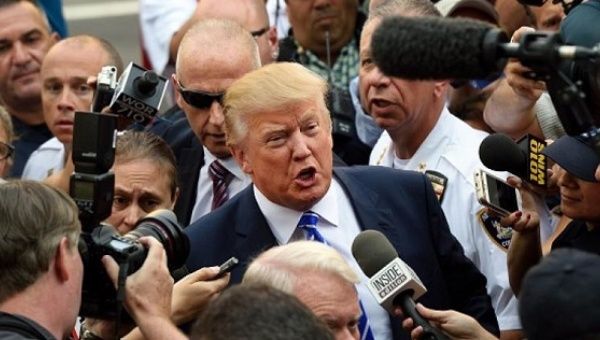President Trump again states he may support bill to end federal cannabis ban
Gardner’s cannabis bill specifically reinforces the 10th amendment

President Donald Trump recently informed reporters that he “probably will end up supporting” a bipartisan bill that would effectively end the federal ban on cannabis.
Upon leaving the White House for the G-7 Summit, a two-day discussion that would result in a feud between Trump and Canadian Prime Minister Justin Trudeau, Trump indicated his support for cannabis reform in the U.S.
The cannabis bill was introduced on Thursday by Sen. Cory Gardner, R-Colo. and Sen. Elizabeth Warren, D-Mass. Trump’s comments are not likely to be well received by Attorney General Jeff Sessions, who is a vocal cannabis opponent.
“I support Senator Gardner. I know exactly what he’s doing,” Trump declared. “We’re looking at it. But I probably will end up supporting that.”
Sen. Cory Gardner wants to take states’ rights approach to legal cannabis

The Justice Department has a very different view on cannabis legalization.
Back in January, Sessions repealed an Obama-era memo promising state-regulated cannabis dealers that they would not be bothered by federal prosecutors, so long as they adhere to state regulations on cannabis.
The intention of these regulations is to prevent drug cartels from getting their hands on drug money, as well as to prevent children from being able to access cannabis.
This isn’t the first time that Trump has demonstrated support for cannabis reform. He also made a suggestion that he would back state laws on cannabis on the 2016 campaign trail.
Trump and Sessions’ gradual separation was made clear when the President vowed to respect state-legalized cannabis back in March.
Backed by the House of Representatives, the bipartisan legislation bill introduced by Gardner could effectively stop the federal government from sticking their noses into cannabis business. Furthermore, the bill would allow cannabis businesses to adopt the federal banking system into their practices; something that would revolutionize the cannabis industry in the U.S.
“We need to take a states’ rights approach to the legal marijuana question,” Gardner wrote on Twitter last Thursday. “Our bill does not legalize marijuana. Instead, it allows the principle of federalism to prevail as the founding fathers intended and leaves the marijuana question up to the states.”
Trump and Trudeau’s clash may benefit America’s cannabis industry
 World leaders from Canada, France, Germany, Japan, UK, USA, and Italy clustered together at the recent G-7 summit in Quebec, which kicked off on June 8.
World leaders from Canada, France, Germany, Japan, UK, USA, and Italy clustered together at the recent G-7 summit in Quebec, which kicked off on June 8.
The aftermath was not expected, with Trump and Trudeau getting into a public disagreement regarding U.S.-imposed tariffs. Trump took it upon himself to attack Trudeau on Twitter after the host country’s PM criticized tariffs imposed on Canadian-imported aluminum by the U.S.
The U.S.-imposed tariffs would also be applied to aluminum imported from Europe, Japan, and Mexico.
“PM Justin Trudeau of Canada acted so meek and mild during our @G7 meetings only to give a news conference after I left saying that, ‘US Tariffs were kind of insulting’ and he ‘will not be pushed around,” Trump tweeted.
Trump described Trudeau as “very dishonest & weak.”
This trade dispute could help the President to achieve federal cannabis legalization in the U.S. If that were to happen, Canada’s stream of revenue from the cannabis industry could potentially dry up. After all, cannabis businesspeople would be more enticed by stateside operations, since they would benefit from bank assurance and long-term potential.
Based on the specifics of Gardner’s cannabis bill, legalizing cannabis on the federal level might just be the right thing to do.
“The bill specifically reinforces the 10th amendment — it is a states’ rights strengthening act. Republicans historically are a states’ rights party, so I think they can really get on board,” said the chair for Dickinson Wright’s Cannabis Practice Group, Tim McCulloch.
















